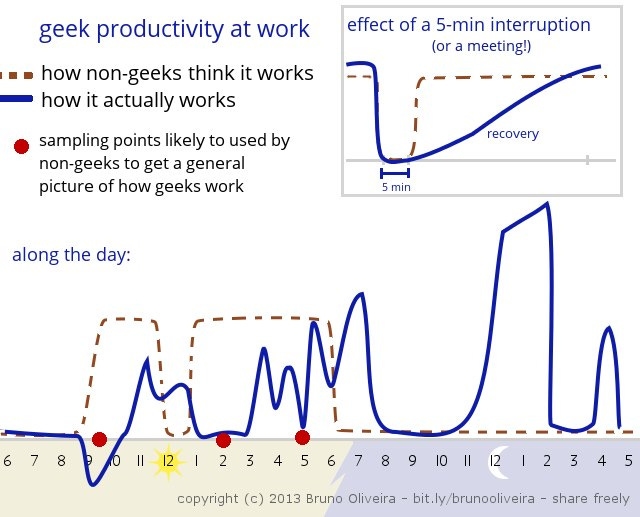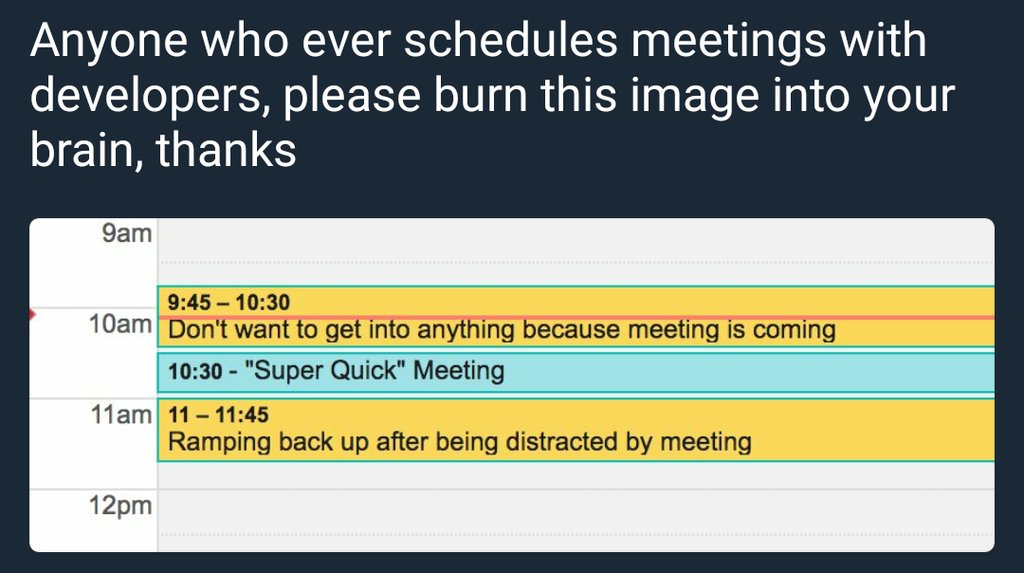The high cost of interruption visualized
You probably don't take your team's calendars seriously enough
Ninlabs Research has a fantastic post outlining the high cost of interruption for programmers. It’s not new, but worth a read and provides data which supports the concept of the maker’s vs. manager’s schedule.
Key findings from the research include:
Based on a analysis of 10,000 programming sessions recorded from 86 programmers using Eclipse and Visual Studio and a survey of 414 programmers, we found:
A programmer takes between 10-15 minutes to start editing code after resuming work from an interruption.
When interrupted during an edit of a method, only 10% of times did a programmer resume work in less than a minute.
A programmer is likely to get just one uninterrupted 2-hour session in a day
We also looked at some of the ways programmers coped with interruption:
Most sessions programmers navigated to several locations to rebuild context before resuming an edit.
Programmers insert intentional compile errors to force a “roadblock” reminder.
A source diff is seen as a last resort way to recover state but can be cumbersome to review
This high cost of interruption and scarce amount of uninterrupted time in the day doesn’t just apply to programmers of course. It applies to all involved in a creative field or any type of deep work. The trick, as productive people understand, is to minimize interruption and ensure you’re spending uninterrupted time on the highest value activities.
Common sense, sure, but it’s sad how frequently it’s forgotten by those who give in to ‘the high cost of now’ or let others interrupt their workflow. Slack and other ‘productivity’ tools may be doing more harm than good vs async project management software.
Related to the above, I found a visualization from Bruno Oliveira showing visually just how much impact disruptions can have on our time.
Despite the visualization talking about “geeks” I would argue this high cost of interruption applies to all workers in creative fields. Especially in cases we are trying complex things that have never been done or working on something which requires a flow experience and focus to do well. All the more reason to reduce things like meetings and let your team focus on deep work (the important stuff).
Here’s another visualization of the above, even simpler.
Focusing is underrated, and has been for quite some time. Yet it’s the secret to great work and solving the interruption problem outlined above. Twitter, email, phone calls, instant messages, web browsing – they are all distractions and ultimately collateral tasks. They constantly call for your attention but they don’t make a real difference in accomplishing objectives from a production standpoint. And if you’re not a prolific producer, you’re never going to be successful.
Related to all of this, a crazy thing has happened in modernity: we feel a need to get everything in real-time, and almost nothing actually requires this. As Seth Godin notes, this is costly:
The closer you get to the source and moment of information, the more it costs.
If you want to know how the stock market did in 2006, you can spend ten seconds and find it in Wikipedia. If you want to know about today, you’ll need to invest a few clicks and you’ll get the delayed results. Or you could pay a lot of money for a stock market terminal and get the current prices. Or you could even risk prison and get some inside information about what’s going to happen before it happens.
More than ever, there’s a clear relationship between how new something is and how much it costs to discover that news.
You can check your email twice a day pretty easily. Once every fifteen minutes has a disruption cost. Pinging it with your smartphone every sixty seconds is an extremely expensive lifestyle/productivity choice.
Sure, go ahead, stay hyper-current, but realize it’s not free.
Final thoughts: I’ve previously shared observations on millennials – but something not discussed is the fact that our generation did grow up multitasking (not a good thing). We grew up working on projects and studying while browsing the web, eating dinner, and talking with our peers. I only learned self-discipline later in life, but had to unlearn many of the bad habits acquired growing up multitasking. You don’t have much to gain from it, because while you may feel like you’re getting more done, the results of your efforts suffer. So do all you can to ensure your team is given appropriate focus time. They have enough distractions, you shouldn’t be another.





So spot-on this is. I had a manager once that regularly bragged about how good he was at multi-tasking between projects and that I, a simple software engineer, should similarly be able to work simultaneously on several projects at once.
I will neither confirm nor deny that I have, on many occasions, put 4 hours meetings on my calendar to block out time to actually get stuff done.